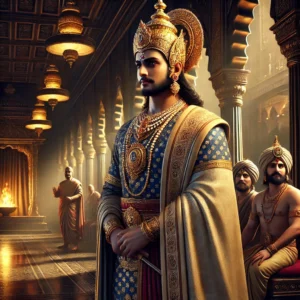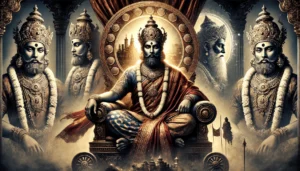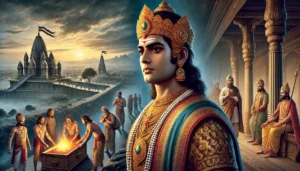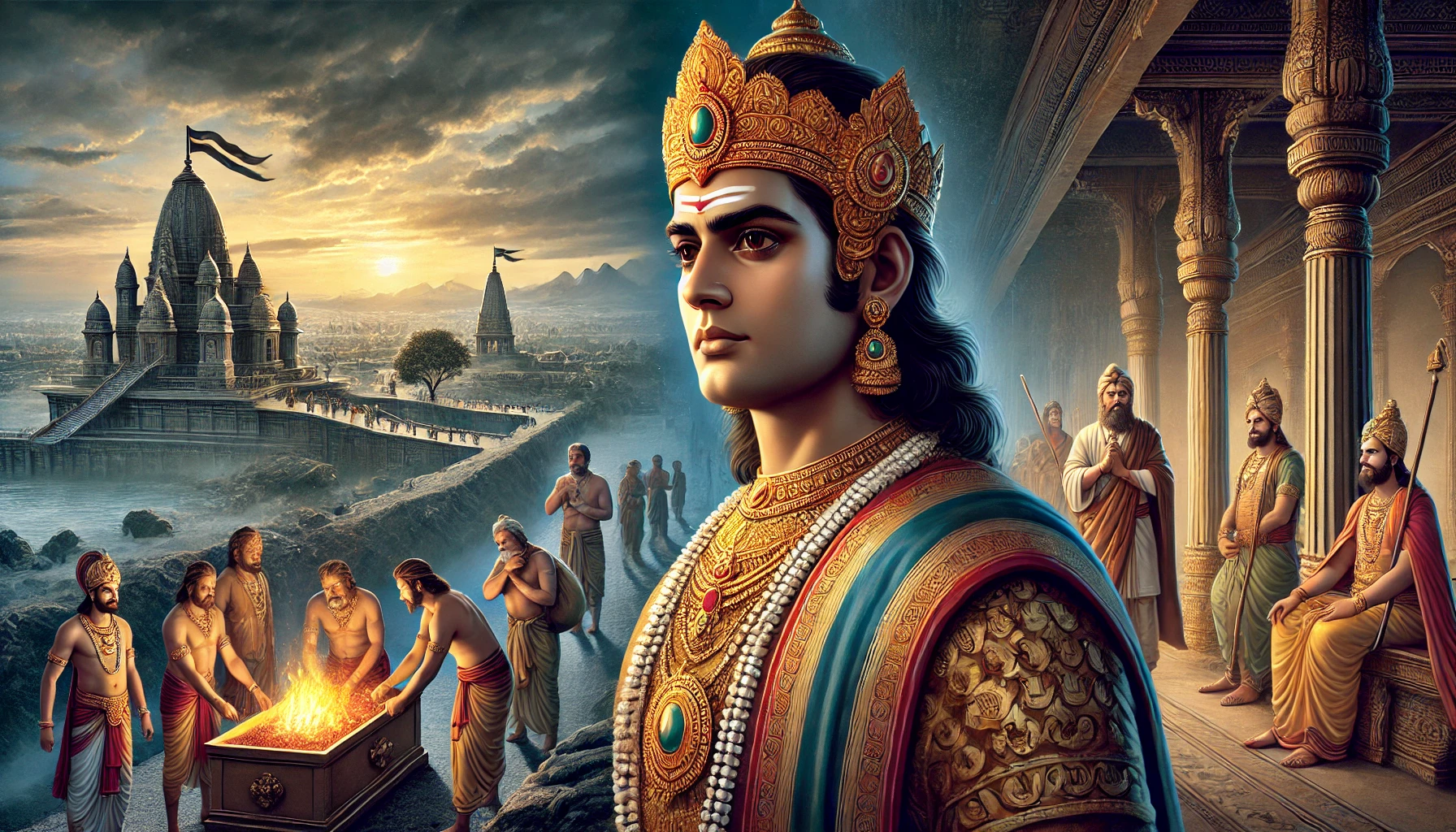
Life history of King Harishchandra and his sacrifices
Lessons from King Harishchandra: Sacrificing Wealth for Truth
King Harishchandra, a legendary ruler of Ayodhya, is one of the greatest embodiments of truth (Satya) and righteousness (Dharma) in Hindu tradition. His story, narrated in the Markandeya Purana, Devi Bhagavata Purana, and Valmiki Ramayana, serves as an eternal lesson on integrity, sacrifice, and unwavering devotion to truth. His life is a testament to the idea that moral values outweigh material wealth and that righteousness, even in the face of extreme adversity, ultimately leads to divine blessings.
Even today, in a world filled with material temptations, corruption, and moral dilemmas, King Harishchandra’s life remains an inspiring example of how one must uphold truth and justice at all costs. His sacrifices remind us that while wealth and power may be temporary, virtue and honesty leave a lasting impact on humanity.
The Story of King Harishchandra
Harishchandra was a noble and just king who ruled his kingdom with fairness and kindness. His fame spread far and wide, and he was known for his unwavering commitment to truth. His righteousness, however, was put to the ultimate test when the great sage Vishwamitra decided to challenge his integrity.
One day, in a dream, Vishwamitra appeared before Harishchandra and demanded that he fulfill a promise to donate his entire kingdom. Being a man of his word, Harishchandra agreed without hesitation and handed over his wealth, land, and power. Left with nothing, he, along with his wife Taramati and young son Rohitashva, was forced into exile.
As they wandered in search of food and shelter, their suffering only deepened. With no means of survival, Harishchandra took up a job as a cremation ground worker, collecting fees for performing last rites. His wife, too, was forced into servitude. Yet, despite such humiliating circumstances, he did not once compromise on his values.
The greatest test came when his son, Rohitashva, fell ill and died. Taramati, devastated and grieving, brought the child’s body to the cremation ground, only to be confronted by Harishchandra, who was duty-bound to ask for the cremation fee. Though he was shattered inside, he remained true to his responsibility.
At this moment, the gods, pleased with his steadfastness, appeared before him. They restored his son to life and reinstated his kingdom. The heavens rejoiced, and Harishchandra was rewarded for his unwavering devotion to truth and dharma.
Table of Contents

Life history of King Harishchandra and his sacrifices
Lessons from King Harishchandra
- Truth is Greater than Material Wealth
Harishchandra’s willingness to sacrifice his kingdom and endure extreme hardships demonstrates that truth is far more valuable than material possessions. In today’s world, where wealth is often prioritized over honesty, his story reminds us that real wealth lies in one’s principles and character.
- Dharma Must be Upheld at All Costs
Despite unimaginable suffering, Harishchandra never abandoned his dharma. His example teaches us that one must remain committed to righteousness, no matter the difficulties faced. In today’s times, where moral compromises are common, his story encourages us to stay true to our ethical responsibilities.
- Patience and Perseverance Lead to Divine Rewards
Harishchandra’s trials show that patience and perseverance in upholding truth eventually lead to divine intervention and blessings. His life reinforces the belief that challenges test our faith and, if endured with integrity, lead to greater rewards.
- Honesty is the Foundation of a Just Society
A society built on truth and honesty thrives, while one based on falsehood and deceit crumbles. Harishchandra’s dedication to truthfulness teaches us that integrity must be the foundation of our personal and professional lives. His story influenced many great personalities, including Mahatma Gandhi, who based his Satyagraha movement on the principles of truth and non-violence.
- The Impermanence of Material Possessions
Harishchandra’s willingness to part with his kingdom reminds us that wealth, power, and status are temporary. No matter how rich or powerful one is, these things can be lost in an instant. True wealth lies in virtues such as honesty, kindness, and righteousness.
- True Leadership is Rooted in Ethics
As a king, Harishchandra led not through power but through moral example. His life teaches us that real leadership is about upholding ethical values rather than seeking personal gain. In the modern world, where corruption and greed often cloud leadership, his story serves as a guiding principle for those in positions of power.
- Family and Duty Can Go Hand in Hand
Harishchandra’s painful dilemma of charging his own wife for their son’s cremation highlights the complex relationship between duty and personal emotions. While he was deeply attached to his family, he never let emotions cloud his sense of justice. His story teaches us that responsibilities must be upheld, even when personal sacrifices are required.
- The Power of Divine Justice
Harishchandra’s trials prove that divine justice always prevails. While he endured immense suffering, he was ultimately rewarded for his honesty. His story reassures us that righteousness may face challenges, but in the end, truth always triumphs.
The Relevance of Harishchandra’s Story in Modern Times
In today’s fast-paced and materialistic world, where people often prioritize wealth, success, and convenience over truth and ethics, King Harishchandra’s story holds profound relevance. From corporate scandals to political dishonesty, from personal betrayals to legal injustices, the world is filled with instances where truth is compromised for short-term gains.
However, Harishchandra’s life reminds us that truth is eternal and that honesty, though difficult, brings lasting peace and honor. His story teaches that wealth can be regained, power can be restored, but lost integrity can never be reclaimed.
Even in small ways, we can apply his lessons in our daily lives:
By being truthful in our relationships and commitments
By standing against corruption and dishonesty
By prioritizing ethical business and professional practices
By teaching future generations the value of honesty and righteousness

Conclusion
King Harishchandra’s life is a shining beacon of moral excellence. His unshakable commitment to truth and duty continues to inspire people across generations. His story is not just a tale from ancient scriptures but a lesson in how one should live with honor, integrity, and selflessness.
In a world where materialism often overshadows morality, Harishchandra’s legacy stands as a timeless reminder that truth, righteousness, and virtue are the greatest treasures one can possess. By following his path, we, too, can lead lives of integrity and inspire others to uphold the values of truth and justice.
(FAQs) on “King Harishchandra: A Timeless Lesson in Truth and Sacrifice”:
- Who was King Harishchandra?
King Harishchandra was a legendary ruler of the Ikshvaku dynasty, renowned for his unwavering commitment to truth (satya) and righteousness (dharma). His story is mentioned in Hindu scriptures like the Markandeya Purana, Devi Bhagavata Purana, and Ramayana.
- What is the main lesson from King Harishchandra’s life?
The primary lesson from his life is that truth and integrity are more valuable than material wealth. He sacrificed his kingdom, family, and personal comfort to uphold his promise and righteousness, demonstrating that truth always triumphs in the end.
- Why did King Harishchandra lose his kingdom?
He lost his kingdom due to a divine test by Sage Vishwamitra. To fulfill his promise, he gave away his kingdom and wealth, eventually becoming a servant in a cremation ground.
- How did King Harishchandra uphold truth despite hardships?
Even after losing everything, he did not abandon his principles. He worked as a crematorium caretaker and remained steadfast in his honesty, refusing to take shortcuts or accept falsehood to escape his suffering.
- How does King Harishchandra’s story relate to modern life?
His story teaches the importance of honesty, duty, and perseverance, even in the face of adversity. It inspires people to uphold moral values, even when tempted by material gains or pressured by society.
- Was King Harishchandra ultimately rewarded?
Yes, in the end, his integrity and devotion to truth moved the gods, who restored his kingdom, family, and honor. He was later taken to heaven by Lord Indra as a reward for his righteousness.
- How is King Harishchandra remembered in Indian culture?
His legacy continues in literature, folklore, and performing arts. His life has inspired plays, films, and even social reformers like Mahatma Gandhi, who considered him a role model for truthfulness.
- What role did Queen Taramati and Prince Rohitashva play in his story?
Queen Taramati and their son Rohitashva also endured immense suffering. Taramati was sold into servitude, and Rohitashva tragically passed away. Despite these hardships, Taramati remained loyal and devoted, reflecting the family’s collective commitment to truth and righteousness.
- How did Sage Vishwamitra test King Harishchandra?
Sage Vishwamitra, wanting to test the king’s truthfulness, asked for a massive donation. To keep his word, Harishchandra gave away his entire kingdom and wealth, forcing himself and his family into extreme poverty. The sage continued testing him until the gods finally intervened.
- What is the spiritual significance of King Harishchandra’s story?
His story symbolizes the triumph of Dharma (righteousness) over material desires. It teaches that true devotion to truth leads to liberation (moksha) and divine blessings, making him an ideal figure in Hindu ethics and spirituality.
Summary
King Harishchandra: A Timeless Lesson in Truth and Sacrifice
King Harishchandra, a legendary ruler from ancient Indian history, is renowned for his unwavering commitment to truth and righteousness. His life is a testament to the ideals of honesty, integrity, and sacrifice, making him an enduring symbol of dharma. His story, found in texts like the Markandeya Purana and Srimad Bhagavatam, continues to inspire generations, highlighting the importance of staying true to one’s principles even in the face of extreme adversity.
Harishchandra’s Prosperous Reign and the Divine Test
Harishchandra was a just and noble king, ruling with wisdom and ensuring the welfare of his subjects. His kingdom flourished under his leadership, and he was admired for his fairness, generosity, and devotion to truth. However, his steadfast adherence to truth was put to the ultimate test when Sage Vishwamitra, known for his severe penance and spiritual powers, decided to assess the king’s integrity.
Vishwamitra approached Harishchandra and, through divine will, made him promise a great sacrifice. Without hesitation, Harishchandra agreed. The sage demanded the king’s entire kingdom as dakshina (offering), leaving Harishchandra and his family homeless and penniless. But his trials did not end there—Vishwamitra further asked for a fee to complete the sacrificial ritual, forcing Harishchandra to sell his wife and son into servitude while he himself became a cremation ground worker to earn the required sum.
Harishchandra’s Suffering and Unwavering Truthfulness
Stripped of his royal status and wealth, Harishchandra endured immense hardships. His wife, Queen Shaivya, was forced into servitude, and their young son, Rohitashva, suffered a tragic fate. Despite witnessing his family’s suffering, Harishchandra remained resolute in his commitment to truth. He never once entertained the idea of deceit or compromise, even when faced with extreme sorrow and despair.
As a cremation ground worker, his final test came when his wife brought their deceased son for cremation but had no money to pay for the rites. Bound by his duty, Harishchandra refused to perform the rituals without payment, a moment that epitomized his unwavering adherence to truth, even at the cost of his own emotional agony.
Divine Intervention and the Ultimate Reward
Moved by Harishchandra’s unwavering commitment to truth and righteousness, the gods intervened. Lord Vishnu, along with Sage Vishwamitra and other celestial beings, appeared before him, restoring his son to life and returning his kingdom. The entire ordeal was revealed as a divine test of his devotion to dharma. Harishchandra’s steadfastness had earned him a place among the greatest of righteous rulers, and he was blessed with a prosperous and just reign once again.
Lessons from King Harishchandra’s Story
- Truth Above All – Harishchandra’s life teaches that truth is the highest virtue, even if it brings suffering in the short term. Upholding righteousness will ultimately lead to divine grace.
- Sacrifice for Dharma – One must be willing to make personal sacrifices to uphold moral and ethical values.
- Faith and Perseverance – No matter how severe the hardships, unwavering faith and patience will lead to eventual justice and redemption.
- The Power of Divine Justice – The gods reward those who remain truthful and righteous, proving that dharma always triumphs in the end.
Harishchandra’s story continues to inspire people across generations, reinforcing the ideals of selflessness, virtue, and moral courage. His legacy remains an eternal beacon of righteousness, reminding us that truth and sacrifice pave the way to ultimate honor and spiritual fulfillment.
Unlock the Ancient Wisdom of Sanatan Dharma – Join Us on YouTube!
👉 Subscribe now to Prachin Sanatan Dharma and embark on a journey of enlightenment.
Explore timeless teachings, spiritual insights, and cultural richness on our YouTube channel, Prachin Sanatan Dharma. Dive deep into the essence of Sanatan Dharma through captivating videos that inspire and educate.
Related Articles
- Restful Nights: Ayurvedic Remedies and Traditional Indian Practices to Overcome Insomnia and Late-Night Habits
- The Tridevi: Lakshmi, Saraswati, and Parvati – Their Roles and Powers
- “Divine Creatures of Ancient Indian Scriptures: Exploring the Role of Animals in the Vedas, Puranas, and Mahabharata”
- Nature and Spirituality: Exploring the Sacred Essence of the Himalayas, Ganga, and Other Natural Wonders”
- “Reviving the Gurukul System: Relevance and Lessons for Modern Education”
- “Exploring Greek and Indian Mythology: Similarities Between Greek and Indian Mythology “
- “Embracing Sattvic Living: Harmonizing Mind, Body, and Soul Through Food and Lifestyle”
- “Charity and Prosperity: Exploring the Concept of Daan and Its Financial Relevance in Modern Life”
- How to Build an Eco-Friendly Home Inspired by Vastu Shastra
- Comparison of Ancient and Modern Sports: How Traditional Sports Have Influenced Contemporary Games
- “Timeless Lessons from Ancient Tales: Linking Samudra Manthan and Ganga’s Descent to Modern Ecological Challenges”
- “Reviving Sanskrit: How AI is Preserving Ancient Languages for the Future”
- “Mathura: The Sacred Land of Lord Krishna’s Divine Leelas”
- Investing for Future Generations: Lessons from Indian Traditions on Legacy Building and Wealth Preservation
- “Ancient Indian Wisdom: Timeless Lessons for Tackling Today’s Climate Crisis”
- “Artificial Intelligence and Spirituality: Transforming Ancient Practices for the Modern World”
- “Gold and Real Estate in India: Timeless Assets Shaping Financial Strategies”
- Tradition Meets Innovation: The Evolution of Technology in Hindu Rituals
- End-of-World Myths: Exploring Kali Yuga in Hinduism and Ragnarök in Norse Mythology
- Garuda, Pegasus, and Dragons: The Universal Ties of Mythical Beasts Across Cultures
- “Ancient Vimanas: Mythical Flying Machines or Evidence of Advanced Technology?”
- Time Travel in Hindu Mythology: The Fascinating Tales of Kakudmi and King Raivata
- “Divine Feminine Power in Hindu Mythology: The Legends of Durga, Saraswati, and Lakshmi”
- “Divine Beings of Sanatan Dharma: The Spiritual Significance of Sacred Animals in Hinduism”
- “Symbolism in Mythological Art: Unlocking Hidden Meanings in Ancient Temple Carvings”
- “Exploring Technological Advancements in Ancient India and Civilizations: Vimana, Metallurgy, & Water Management systems”
- Unveiling the Mysteries: Ancient Temples of Sanatan Dharma , Mysterious Temples of India
- “The Scientific Knowledge of Sanatan Dharma: Ancient Wisdom Meets Modern Science”
- Ancient Indian Sports and Games: Celebrating a Legacy of Skill, Strength & Strategy”
- “Exploring the Cosmic Link: The Connection Between Astronomy and Vedic Astrology”
- The Power of Sanskrit: Unlocking the Divine Language of the Gods
- “The End of Kaliyuga: A Sanatan Insight into the World’s Final Chapter”
- Explore more articles on Prachin Sanatan Yuga.
Life history of King Harishchandra and his sacrifices Life history of King Harishchandra and his sacrifices Life history of King Harishchandra and his sacrifices Life history of King Harishchandra and his sacrifices Life history of King Harishchandra and his sacrifices Life history of King Harishchandra and his sacrifices Life history of King Harishchandra and his sacrifices
Life history of King Harishchandra and his sacrifices Life history of King Harishchandra and his sacrifices Life history of King Harishchandra and his sacrifices Life history of King Harishchandra and his sacrifices Life history of King Harishchandra and his sacrifices Life history of King Harishchandra and his sacrifices Life history of King Harishchandra and his sacrifices
Life history of King Harishchandra and his sacrifices Life history of King Harishchandra and his sacrifices Life history of King Harishchandra and his sacrifices Life history of King Harishchandra and his sacrifices Life history of King Harishchandra and his sacrifices Life history of King Harishchandra and his sacrifices Life history of King Harishchandra and his sacrifices
Life history of King Harishchandra and his sacrifices Life history of King Harishchandra and his sacrifices Life history of King Harishchandra and his sacrifices Life history of King Harishchandra and his sacrifices Life history of King Harishchandra and his sacrifices Life history of King Harishchandra and his sacrifices Life history of King Harishchandra and his sacrifices
